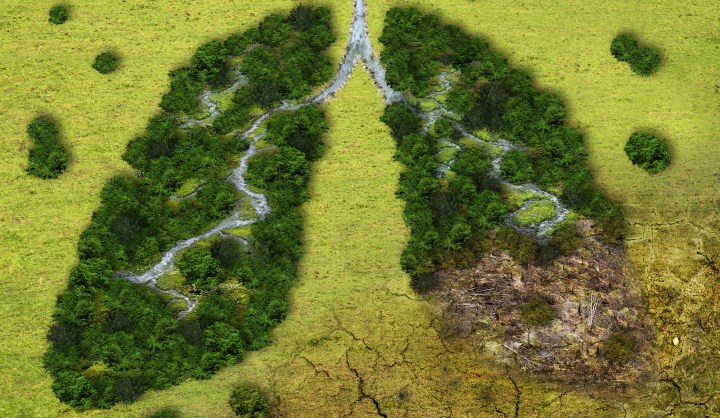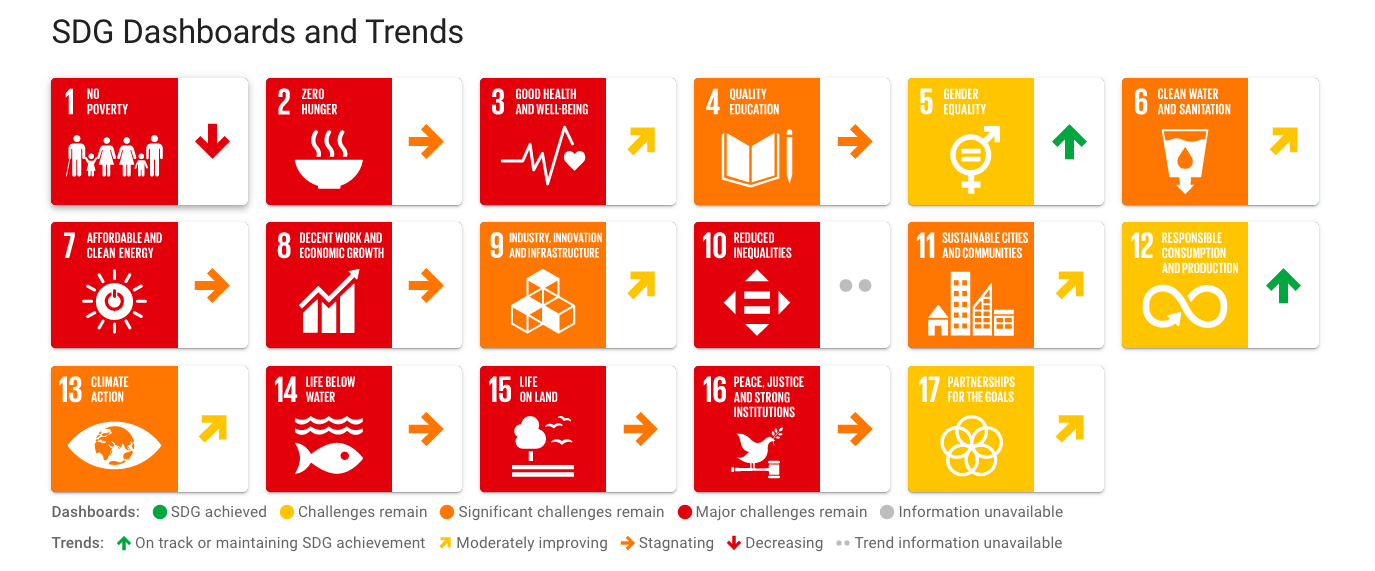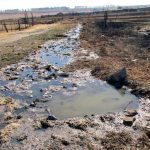WORLD ENVIRONMENTAL HEALTH DAY
Midway to the deadline for achieving Sustainable Development Goals, South Africa is not faring well

From floods in KwaZulu-Natal to smoggy city air and burst dam walls — environmental health and the climate crisis play a role in how we are faring with our Sustainable Development Goals.
The theme for this year’s World Environmental Health Day was Strengthening Environmental Health Systems for the Implementation of the Sustainable Development Goals (SDGs) — and to commemorate the day on Monday, the Department of Health held a webinar focused on strengthening the implementation of the SDGs and the intersectional relationship that environmental health has with these goals.
The Sustainable Development Goals are 17 goals under the 2030 Agenda for Sustainable Development that all United Nations member states adopted in 2015.
The UN says the SDGs: “recognised that ending poverty and other deprivations must go hand-in-hand with strategies that improve health and education, reduce inequality, and spur economic growth — all while tackling climate change and working to preserve our oceans and forests”.
After seven years, we are at the midway point of the 2030 deadline, but not much progress has been made. South Africa ranks 108 globally out of 163 countries and has an overall score of 63.7 out of 100.

(Image: Supplied)
The deputy minister of health, Dr Sibongiseni Dhlomo, said in his keynote address at the webinar: “This theme re-emphasises the need not only for environmental health services but the entire health sector to ensure alignment of programmes by all health and related sectors in the delivery of the services to ensure contribution to the attainment of the Sustainable Development Goals (SDGs) 2030.”
The intersectionality of the health sector
SDG Goal 3 is to “ensure healthy lives and promote wellbeing for all at all ages”, but at the webinar, Dhlomo, as well as environmental health experts from the government, academia, health regulatory bodies and NGOs, emphasised that health was interconnected with all 17 of the SDGs.
“There is a recognition that action taken in one area will affect outcomes in others, and that development of the country must balance social, economic and environmental sustainability,” said Dhlomo.
“This must be done while at the same time we are tackling climate change, which should include preservation of our oceans, atmospheres and forests.”
Dr Joyce Shirinde, a researcher and senior lecturer at the School of Health Systems and Public Health at the University of Pretoria, highlighted that for the second year in a row, the world was no longer making progress on the SDGs.
Shirinde emphasised that health has an impact on all other SDGs — that inadequate housing causes deaths (as in the KZN floods), inadequate water and sanitation and hygiene cause an estimated 10 diarrhoea deaths a day in low and middle-income countries, and air pollution causes respiratory illnesses.
Health and the climate crisis
“Achieving SDG 3 depends on progress in other SDGs or policy agendas, such as poverty reduction, education, nutrition, gender equality, provision of clean water and sanitation, sustainable energy, climate action and safer cities,” said Dhlomo.
For example, a target under SDG 4 (health) is to substantially reduce the number of deaths and illnesses from hazardous chemicals and air, water and soil pollution and contamination.
The World Health Organization (WHO) reports that the mortality rate for air pollution in South Africa is 82 deaths per 100,000 population.
Dhlomo acknowledged the recent tailings dam burst in Jagersfontein in the Free State which he said, “reminded us in the country of the importance and critical role that environmental health practices play in protecting human health and preserving life. We need to continue to use the lessons of this painful experience to educate them about our roles.”
Many other SDG goals link to our dependence and influence on the climate, which the webinar highlighted has a significant impact on our health.
Clean water and sanitation
SDG 6 is to “ensure availability and sustainable management of water and sanitation for all”.
Amanda Mbikwana, a founder member and chairperson of the Centre for Children’s Environmental Health of SA, said children were particularly vulnerable to environmental health impacts. For example, water and sanitation-related diseases remain the leading cause of death in children under the age of five, with 297,000 children under five dying from diarrhoea every year.
“Improving equitable access to water, therefore, underpins the success of all SDGs,” said Mbikwana.
Daniel Nkuna, the deputy director of environmental health at the National Department of Health, said environmental health’s contribution to this goal included water quality monitoring to ensure the safety of drinking water.
“For the protection of public health, we monitor that the water provided by water services authorities and providers is fit for human consumption,” said Nkuna.
Sustainable cities
SDG 11 is to “make cities and human settlements inclusive, safe, resilient and sustainable”.
Shirinde said air quality in our cities exceeds WHO standards, and SA standards in some parts of the country.
Dr Samantha Lange, a member of the Professional Board for Environmental Health and the Health Professions Council of South Africa, said for us to achieve SDG 11, “We need to reduce the proportion of urban populations in informal settlements, we need to increase the proportion of solid waste collected and adequately treated, and we need to decrease the average mean fine particulate matter.”
Nkuna said environmental health played an important role in air quality management.
“EH [environmental health] is part of stakeholders that sit in all air quality priority areas meetings,” said Nkuna.
“The department has domestic indoor air quality guidelines which seek to guide EHPs [environmental health practitioners] on monitoring indoor air within households.”
Nkuna added that education and awareness played a critical role in the prevention and management of illnesses associated with air quality and that the department had drafted a healthcare risk waste regulation, which would be promulgated soon.
Sustainable consumption and production
SDG 12 is to ensure sustainable consumption and production patterns, with a target to: “By 2030, achieve the environmentally sound management of chemicals and all wastes throughout their life cycle, in accordance with agreed international frameworks, and significantly reduce their release to air, water and soil in order to minimise their adverse impacts on human health and the environment.”
Mbikwana said that years of evidence had shown that widespread positive changes in societal behaviour had been attributed to children becoming aware of the problems they observed in their communities.
Nkuna said that environmental health played an important role in pollution prevention through inspection, awareness campaigns and investigation of pollution activities, and that the department had developed draft regulations to strengthen enforcement.
Climate action
SDG 13 is to: “take urgent action to combat climate change and its impacts”.
Dhlomo said: “Environmental health has been part of a team responding to the devastating floods that happened in KwaZulu-Natal in April of this year.
“The floods washed away infrastructure, land, houses, and greatly affected livelihoods. Sadly, 435 people lost their lives and at least 80 are still reported missing. A total of 19,113 households with 128,743 people have been affected by the disaster; 5,704 houses were reported destroyed and 9,659 damaged.
“It was also reported that a total of 6,814 people were homeless in over 50 evacuation shelters (most in eThekwini). The floods also affected businesses including over 600 schools that were damaged and closed and 66 public healthcare facilities.
“The response to the floods led to the need to strengthen the environmental health services across the three spheres of government.”
Lange said that to address this goal, disaster risk reduction strategies needed to be increased. In reference to the floods in KZN, Lange said she had recently visited the province and saw huge sugarcane fields being cleared for luxury developments.
“Then one wonders, where are we?” asked Lange. “Are we knowledgeable enough in ecology, in the environment? Are we making our voice heard as environmental health [practitioners]?”
Shirinde said that South Africa was contributing a lot of greenhouse gases, and while the country has a transition framework, challenges remained with this goal.
Mbikwana said that globally, approximately one billion children are at an “extremely high risk” from the impacts of the climate crisis through experiencing climate shocks, and inadequate access to clean water and healthcare.
“As climate change disrupts the environment, children are being forced to grow up in a world that threatens their health, nutrition, education, survival and future,” said Mbikwana.
Nkuna said that environmental health should incorporate climate change mitigation and adaptive measures as part of its functions.
“This includes being part of the outbreak response teams, integrated surveillance disease response and joint operations committees across all spheres of government.”
Nkuna added that the Department of Health was working with the Department of Forestry, Fisheries and the Environment to develop a climate change and health adaptation strategy and educate communities and other stakeholders on climate change impacts.
Affordable and clean energy
To reach SDG 7, affordable and clean energy, Lange said South Africa needed to focus on a primary reliance on clean tools and technologies — which is not where we are currently, being 80% reliant on coal.
Mbikwana said that the use of biomass fuel was a major source of household pollution, but access to clean fuels and technologies for cooking could reduce mortality rates attributed to household air pollution. DM/OBP





















Comments - Please login in order to comment.